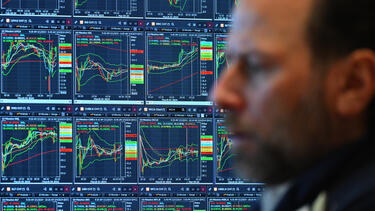What Does a Record Stock Market Mean?
The S&P 500, Dow Jones Industrial Average, and Nasdaq Composite have all set records in recent weeks. We asked Yale SOM’s William Goetzmann, an expert on financial markets and the history of finance, what soaring stock prices say about the economy and the future of the markets.

A trader on the floor of the New York Stock Exchange on March 4.
How meaningful are these records from a long-term historical point of view?
Theoretically they mean almost nothing. There is very little evidence that stock market booms are necessarily followed by declines. And even less evidence that is it possible to reliably forecast the market based on trends.
Are the indices good indicators about the broader market and the real economy?
The S&P 500 is a value-weighted index of large company stocks, and stock prices are forward-looking. When you invest in the stock market you are investing in future earnings and future growth of companies. Recently a few very large technology companies have dominated the index. Investors have bid up prices of these stocks based on expectations about their role in the future of the economy.
So current stock prices may reveal less about where we are now, and more about where we hope or expect to be in the future. Because of this, economists find the stock and bond markets useful as leading indicators. The dominance of a few companies suggests that investors believe these firms are strategically positioned to profit from technological innovation in the years to come.
Do these milestones have an effect on people’s investing behavior?
That is a good question but difficult to answer. News about them draws attention to the stock market. This could motivate some to invest in the market. Others might worry that what goes up must come down. The S&P 500 does not hit an all-time high very often, and it takes a lot of data to draw meaningful conclusions. For example, on March 1, 2024 the SPP closed at 5,137.08 and the next trading day declined slightly to 5,130.95. On January 19 it closed at 4,839.81 and then closed next session at 4,850.43—indeed, it continued to rise for most of the next month. There is no clear pattern of investor response to these milestones.